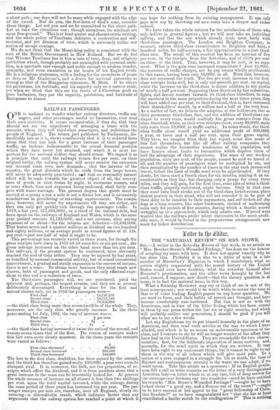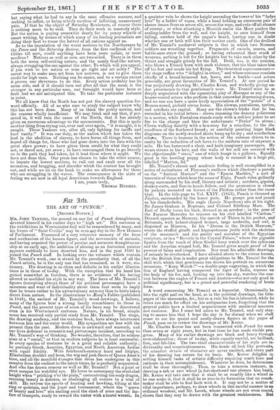Itittr in iiihitnr.
THE "SATURDAY REVIEW" ON MRS. STOWE.
Sni,—A writer in the Saturday Review of last week, in an article on "Mrs. Beecher Stowe's Wounded Feelings," has done me the honour of coupling my name with hers. It does not appear exactly why he has done this. Probably it is due to a letter of mine in a late number of Macmillan's Magazine, in which I maintained, what no person slightly acquainted with the recent history of the United States could ever have doubted, what the reviewer himself after Fremont's proclamation, and the other news brought by the last mail, cannot, I suppose, now doubt—that the slavery question is at issue, is in fact the material issue, in this war.
What a Saturday Reviewer may say or think of me is. not of the least consequence; nor would it be worth while to notice the tone of that or of other leading English papers on any home question. We are used to them, and their habits of speech and thought, and have become comfortably case-hardened. But this is not so with the Americans, and in view of the bitter feeling which has been roused in them by our press within the last six or ei„..ht months, and which will probably outlive our generation, I should be glad if you will allow me to say a few words. Let any Englishman try to put himself honestly in the place of an American, and then read such articles as the one to which I have alluded, and which is by no means an unfavourable specimen of the class, and I venture to say he will no longer wonder at the effect they have had in the United States. They are remarkable for two charac- teristics; first, for the deliberate imputation of mean motives, and, secondly, for the cruel spirit in which they are written. It may have been right to say unpleasant things, but it cannot be right to say them in the way of all others which will give most pain. To a nation or a man engaged in a struggle for life or death, the tope of flippant and contemptuous serenity is the worst we can adopt, if we must speak. Take this article as a specimen : If an En.glish gentle- man felt a call to write remarks on the letter of a very distinguished American lady—a letter which is, at any rate, full of deep sorrow for the estrangement between our two countries—need he have entitled his remarks "Mrs. Stowe's Wounded Feelings ?"—ought he to have talked about "a good cry, and a flounce out of the room ?"_ought he to have sneered at her appeal to the "great fellowship of Chris- tian freedom?" or to have congratulated her "that she has at least contributed a lucifer match to the conflagration P This is nothing but saying what he had to say in the most offensive manner, and seeking to inflict, or being utterly careless of inflicting, unnecessary pain. If that be the object of Saturday Reviewers, of course there is nothing more to be said. They do their work in masterly style. But the nation is paying somewhat dearly for its penny whistle of smart writing, by means of which many of its leading journalists are doing their best to rouse the hatred of all nations against us. As to the imputation of the worst motives to the Northerners by the Times and the Saturday .Review, from the first outbreak of hos- tilities till now, could anything have been more unfair, or more needless? Nations as well as men are two-sided. There is in them both the mean self-seeking nature, and the manly God-like nature, always struggling the one against the other. To which will you appeal, if you wish to see nation or man go right and act nobly? The surest way to make men act from low motives, is not to give them credit for high ones. Nothi can be easier, and to a certain extent it proves our cleverness to do this. Every action probably has its mean side, and if it should turn out after all that the mean is the stronger in any particular case, our foresight would have been at fault had we not anticipated this. To take the particular instance in point. We all know that the North has not put the slavery question for- ward officially. All of us who care to study the subject know why this has not been done. Many of us think the policy unwise, and the reasons wholly insufficient. We may think and say that, if per- sisted in, it will ruin the cause of the North, that it has already given an enormous advantage to the secessionists. But this is quite another thing from cuing out, over and over again, "it is naught, it is naught. These Yankees are, after all, only fighting for tariffs and hurt vanity." It was our duty, as the nation which has taken the lead in the abolition of slavery, to have borne all things from, and hoped all things for, those who had gone down into the lists with the great slave power; to have given them credit for what they could not, or dared not, yet avow ; to have encouraged them to go bravely on in the path they had taken, let it lead them where it might. We have not done this. Our press has chosen to take the other course, to impute the lowest motives, to cull out and exult over all the meanness, and bragging, and disorder which the contest has brought out, and while we sit on the bank to make no allowances for those who are struggling in the waves. The consequence is the state of feeling we see now in all loyal Americans towards England. I am, yours truly,
THOMAS HUGHES.































 Previous page
Previous page